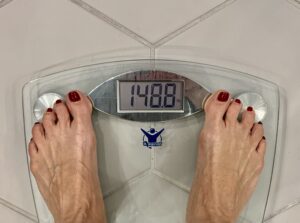Last week I outlined the basics for how I recommend my patients and clients eat in order to lose weight. But I don’t follow this advice to a T. I do avoid added sugar unless it’s a planned special occasion (like Thanksgiving), or unless I’ve messed up and eaten it without planning to (e.g., Halloween candy). My sugar consumption is invariably reflected on the scale as a several pound weight gain. Invariably. When I avoid sugar, I tend to either maintain my weight or lose weight. My goal is to stop eating unplanned sugar in response to cravings or urges, and to only have it on special occasions in a planned, mindful way. I am still working on that!
Flour I am a little more lenient with for myself, but only because I’ve found through trial and error that not all flour containing foods trigger me to want to overeat. I do avoid most bread (although I’ll have a burger on a bun occasionally), crackers, and especially fried flour (e.g., fried dumplings, tempura, or breaded chicken). Flour combined with fat and salt seems to give me the most trouble, and I will reach for two more pieces of warm crusty bread with butter if I open the door to the first one… but I can eat a couple of dry Wasa whole grain crackers with a meal and have zero interest in overeating them. I also have found that pasta (if boiled rather than fried) doesn’t seem to be something I care to overeat, so I don’t restrict that (nor do I eat it often). So I am not as clear cut with my flour consumption, but it’s only after lots of experience and awareness around my own body and mind and identifying what I personally tend to overeat or not. I certainly recommend giving up sugar and flour 100% for at least 4-6 weeks at first before starting to experiment with reintroducing any of it into your diet.
Now, for me, I am driven by a strong desire to improve my brain health and try my best to avoid, or at least delay, the onset of dementia. I have a strong family history of dementia and, according to 23andMe, have one copy of the APOE4 gene which is known to increase one’s risk of Alzheimer’s. There is a variation of eating pattern developed by a team in Chicago headed by Martha Clare Morris that combines the Mediterranean diet with elements of the DASH diet that has been associated with a dramatic decrease in cognitive decline over years of aging when people adhere to it: it’s called the MIND Diet. I adhere to its guidelines as best I can, which means I aim for 6 or more servings of kale or other leafy greens per week plus other veggies every single day, berries (especially blueberries, but also strawberries, raspberries and blackberries) several times a week, nuts and seeds at least 5 servings per week, and fish at least once per week. Fatty fish with the highest level of brain-healthy DHA are my go-to, and because I don’t like gamey tasting fish, I always go for salmon. Fish and krill oil supplements are also a part of my daily diet, but unfortunately it appears that the form that most omega 3 supplements come in are not well absorbed nor incorporated into the brain, especially in people with the APOE4 gene. Dr. Rhonda Patrick recently wrote a review paper arguing for a possible mechanism by which the omega 3 fatty acids in phospholipid form (which are found in real fish, krill oil, and especially salmon roe) may be incorporated into the brain while the ethyl ester form (in most fish oil supplements) are not, and this might explain why scientific research has failed to show that taking fish oil supplements makes a difference for Alzheimer’s prevention or treatment, while eating fish does seem to provide a benefit. She gives a 10 minute overview of the science in this video. The supplements that I take are 4 krill oil capsules, one 4mg astaxanthan capsule, two omega 3 phospholipid capsules, and one DHA Xtra capsule every day. Plus I also eat salmon at least once and up to 3 times per week.
I’ve previously written about one of my favorite ways to eat salmon: I frequently put pumpkin seeds and sunflower seeds on a big old salad of baby kale, my homemade salmon salad, broccoli sprouts, lupini beans, and olive oil vinaigrette, which knocks out many of the MIND Diet components in a single meal.
Another aspect to my own diet is a daily dose of coffee or matcha green tea. I’m careful not to consume caffeine after about 9am to protect my sleep quality, but I sometimes (not always) “fast” through the morning by having coffee with my favorite plant based unsweetened creamer, French vanilla Nutpods.
I also usually have one or two squares of very dark (88% cocoa) chocolate every day at lunchtime – this brand was found to have the highest flavanol content of many brands tested by Consumer Lab, and I love that it comes in prewrapped individual squares to keep me from eating too many. I get it in bulk on subscription from Lucky Vitamin, which is the cheapest I’ve found. This chocolate does have about 1 gram of added sugar per square, but it’s such a small amount that it really doesn’t trigger cravings in me the way other chocolate does.
I have a glass of Lifeway low-fat plain kefir on most days to help keep my gut flora healthy, too, and usually blend in some turmeric, black pepper, and cinnamon for even more health benefits.
And finally, I do my DIY fasting mimicking diet on a quarterly basis (this invariably causes me to drop a few pounds), and I personally eat as many plants as I can and try to mostly avoid saturated fat (found especially in red meat, cheese, and dairy) and alcohol. I’m not a vegetarian, but I play one on as many days as not. I tend to choose Impossible burger over beef, eat lots of lentils, beans, and tofu, and lean toward poultry and salmon as my main sources of animal protein. This, too, is aligned with the MIND Diet.
Now, all of that said, some days (ahem – Thanksgiving) I eat several pieces of pie and have a couple delicious cocktails. Perfection is not required for success, consistency is. When I get into a sugar thing and start gaining weight, I just get myself back off, and that’s the basic secret to my success. When I’m eating sugar, my weight stagnates or increases, and when I stop, it drops. Consistently. If I stayed off sugar entirely I’d weigh 135 right now, but that isn’t how my journey has gone. And that’s ok.
Project 135 stats:
Starting weight: 159.6
Week 1: 157.2
Week 2: 155.6
Week 3: 155.4
Week 4: 153.8
Week 5: 151.0
Week 6: 152.8
Week 7: ? (Dad’s death)
Week 8: 150.8
Week 9: 152.6
Week 10: 154.2
Week 11: 152.6
Week 12: 150.8
Week 13: 150.6
Week 14: 151.6
Week 15: 152.4
Week 16: 152.4
Week 17: 155.2 (sugar binges)
Week 18: 154.4
Week 19: 153.8
Week 20: 151.2
Week 21: 150.2
Week 22: 150.6
Week 23: 151.0
Week 24: 150.6
Week 25: 146.6
Week 26: 148.2 (Halloween candy)
Week 27: 146.8
Week 28: 146.6
Week 29: 148.8 (Thanksgiving)
Total weight loss: 10.8 pounds (6.8%)


